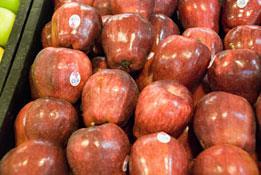
Well into the new season, the Washington apple industry is yet to ship any fruit to one of its most important export markets – China. Allowed only to send Red and Golden Delicious varieties, Chinese plant-quarantine officials have delayed issuing new import permits until they are satisfied that no phytosanitary threats exist to their domestic industry from fruit grown in Washington state.
“There are three post-harvest decay issues (with apples) that China has been concerned with and they’ve delayed issuing any new important permits until a delegation from their plant-quarantine department visits orchards and packing facilities,” said Dr Michael Willett of the Northwest Horticultural Council. “They wanted a formal invitation (for a delegation visit) and that has been extended.”
According to Jim Archer of the Northwest Fruit Exporters, however, no confirmation has been received on when the Chinese delegation will be arriving.“We were told that the earliest a (Chinese plant-quarantine) delegation could arrive would be sometime in late November,” said Archer. “We’re still waiting to get official confirmation on that.”
China is the world’s largest apple producing nation and its government has made no secret of its desire to see its fruit gain access to the US market. That request is under review by the USDA’s Animal Plant Health Inspection Service (APHIS). In what may be an attempt to turn up the pressure on the USDA, China plant-quarantine is asking to do a full review of the Washington apple industry’s management practices and mitigation procedures before they issue any new permits.
“There were some decay problems with some fruit shipments in the past that APHIS has since addressed through implementation of some new post-harvest protocols,” said Willett. “The last detection reported was with fruit from the 2010-11 season with nothing since.”
Willett added that it was possible China may not have realised that there have been no new instances of decayed fruit since the new procedures were put in place by APHIS.
“They are now, as the record from last season was reviewed at great length with Chinese representatives during bi-lateral meetings in Napa (California) in September,” said Willett.
Meanwhile, reports are that the 2012 Washington state apple crop will likely be revised to over 120m cartons from the initial 108.7m carton pre-season estimate.
“The southern districts around Yakima are coming up with much more volume than was originally estimated,” said Willett. “It’s mainly due to the diameter of the fruit this season, which is turning out to be quite large in some areas. With every increase (fruit count per carton), you get about a 10 per cent increase in packed volume.”
Chinese consumers have developed a taste for Washington Red Delicious in recent years, importing more than 700,000 cartons as recently as the 2010-11 season. Last year, however, China’s Red Delicious imports dropped off to just over 350,000 cartons.
With more fruit suddenly on their hands, Washington’s apple growers are no doubt hoping that the Chinese government soon begins issuing import permits in time for the Chinese New Year holiday demand.



